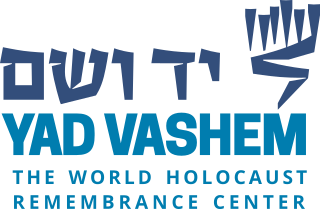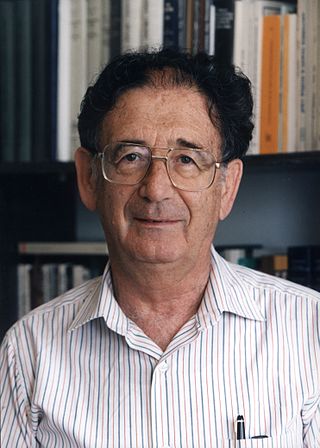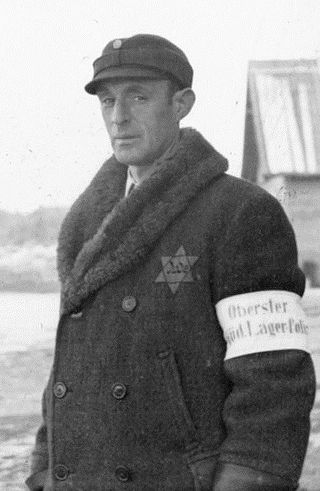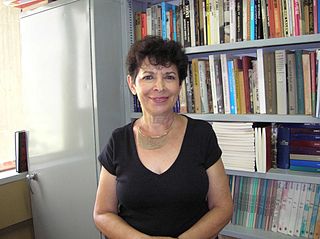Related Research Articles

Yad Vashem is Israel's official memorial to the victims of the Holocaust. It is dedicated to preserving the memory of the Jews who were murdered; echoing the stories of the survivors; honoring Jews who fought against their Nazi oppressors and gentiles who selflessly aided Jews in need; and researching the phenomenon of the Holocaust in particular and genocide in general, with the aim of avoiding such events in the future. Yad Vashem's vision, as stated on its website, is: "To lead the documentation, research, education and commemoration of the Holocaust, and to convey the chronicles of this singular Jewish and human event to every person in Israel, to the Jewish people, and to every significant and relevant audience worldwide."

Righteous Among the Nations is an honourific used by the State of Israel to describe all of the non-Jews who, for purely altruistic reasons, risked their lives in order to save Jews from being exterminated by Nazi Germany during the Holocaust. The term originates from the concept of ger toshav, a legal term used to refer to non-Jewish observers of the Seven Laws of Noah.

Abba Kovner was a Polish-born Jewish partisan leader, and later Israeli poet and writer. In the Vilna Ghetto, his manifesto was the first time that a target of the Holocaust identified the German plan to murder all Jews. His attempt to organize a ghetto uprising failed, but he fled into the forest, joined Soviet partisans, and survived the war. After the war, Kovner led Nakam, a paramilitary organization of Holocaust survivors who sought to take genocidal revenge by murdering six million German people, but Kovner was arrested in the British zone of Occupied Germany before he could successfully carry out his plans. He made aliyah to the State of Israel in 1947. Considered one of the greatest authors of Modern Hebrew poetry, Kovner was awarded the Israel Prize in 1970.

Yehuda Bauer is a Czech-born Israeli historian and scholar of the Holocaust. He is a professor of Holocaust Studies at the Avraham Harman Institute of Contemporary Jewry at the Hebrew University of Jerusalem.

A kapo or prisoner functionary was a prisoner in a Nazi camp who was assigned by the Schutzstaffel (SS) guards to supervise forced labor or carry out administrative tasks.

The International Holocaust Remembrance Day, or the International Day in Memory of the Victims of the Holocaust, is an international memorial day on 27 January that commemorates the victims of the Holocaust, which resulted in the genocide of one third of the Jewish people, along with countless members of other minorities by Nazi Germany between 1933 and 1945, an attempt to implement its "final solution" to the Jewish question. 27 January was chosen to commemorate the date when the Auschwitz concentration camp was liberated by the Red Army in 1945.
Holocaust survivors are people who survived the Holocaust, defined as the persecution and attempted annihilation of the Jews by Nazi Germany and its allies before and during World War II in Europe and North Africa. There is no universally accepted definition of the term, and it has been applied variously to Jews who survived the war in German-occupied Europe or other Axis territories, as well as to those who fled to Allied and neutral countries before or during the war. In some cases, non-Jews who also experienced collective persecution under the Nazi regime are considered Holocaust survivors as well. The definition has evolved over time.

Nakam was a paramilitary organisation of about fifty Holocaust survivors who, after 1945, sought revenge for the murder of six million Jews during the Holocaust. Led by Abba Kovner, the group sought to kill six million Germans in a form of indiscriminate revenge, "a nation for a nation". Kovner went to Mandatory Palestine in order to secure large quantities of poison for poisoning water mains to kill large numbers of Germans. His followers infiltrated the water system of Nuremberg. However, Kovner was arrested upon arrival in the British zone of occupied Germany and had to throw the poison overboard.

Josef Blösche was a convicted war criminal and a member of the Nazi Party who served in the SS and SD during World War II. Blösche shot and killed many Jews, and helped send many more Jews to their deaths in extermination camps. He also participated in several massacres.

Haim Yosef Zadok was an Israeli jurist and politician.

In 1960, the major Holocaust perpetrator Adolf Eichmann was captured in Argentina by Israeli agents and brought to Israel to stand trial. His trial, which opened on 11 April 1961, was televised and broadcast internationally, intended to educate about the crimes committed against Jews, which had been secondary to the Nuremberg trials. Prosecutor and Attorney General Gideon Hausner also tried to challenge the portrayal of Jewish functionaries that had emerged in the earlier trials, showing them at worst as victims forced to carry out Nazi decrees while minimizing the "gray zone" of morally questionable behavior. Hausner later wrote that available archival documents "would have sufficed to get Eichmann sentenced ten times over"; nevertheless, he summoned more than 100 witnesses, most of whom had never met the defendant, for didactic purposes. Defense attorney Robert Servatius refused the offers of twelve survivors who agreed to testify for the defense, exposing what they considered immoral behavior by other Jews. Political philosopher Hannah Arendt reported on the trial in her book Eichmann in Jerusalem: A Report on the Banality of Evil. The book had enormous impact in popular culture, but its ideas have become increasingly controversial.

Dina Porat is an Israeli historian. She is professor emeritus of modern Jewish history at the Department of Jewish History at Tel Aviv University and the chief historian of Yad Vashem.

Dovid Katz is an American-born Vilnius-based scholar, author, and educator specializing in Yiddish language and literature, Lithuanian-Jewish culture, and the Holocaust in Eastern Europe. In recent years, he has been known for combating the so-called "Double Genocide" revision of Holocaust history which asserts a moral equivalence between Nazi Germany and the Soviet Union. He is editor of the web journal Defending History which he founded in 2009. He is known to spend part of each year at his home in North Wales. His website includes a list of his books, of some articles by topic, a record of recent work, and a more comprehensive bibliography.
Dan Bar-On was an Israeli psychologist, therapist, and Holocaust and conflict and peace researcher.
"Like sheep to the slaughter" is a phrase that refers to the idea that Jews went passively to their deaths during the Holocaust. It derives from a similar phrase in the Hebrew Bible that favorably depicts martyrdom in both the Jewish and Christian religious traditions. Opposition to the phrase became associated with Jewish nationalism due to its use in Josippon and by Jewish self-defense groups after the 1903 Kishinev pogrom. During the Holocaust, Abba Kovner and other Jewish resistance leaders used the phrase to exhort Jews to fight back. In postwar Israel, some demonized Holocaust survivors as having gone "like sheep to the slaughter" while armed resistance was glorified. The phrase was taken to mean that Jews had not tried to save their own lives, and consequently were partly responsible for their own suffering and death. This myth, which has become less prominent over time, is frequently criticized by historians, theologians, and survivors as a form of victim blaming.
The Nazis and Nazi Collaborators (Punishment) Law is a 1950 Israeli law passed by the First Knesset that provides a legal framework for the prosecution of crimes against Jews and other persecuted people committed in Nazi Germany, German-occupied Europe, or territory under the control of another Axis power between 1933 and 1945. The law's primary target was Jewish Holocaust survivors alleged to have collaborated with the Nazis, in particular prisoner functionaries ("kapos") and the Jewish Ghetto Police. It was motivated by the anger of survivors against perceived collaborators and a desire to "purify" the community.

Henryk Hirsz Hanoch Barenblat was a Polish-born Israeli musician and conductor, known for his role as head of the Jewish Ghetto Police in the Będzin Ghetto and subsequent legal cases in Poland and Israel which ended with his acquittal by the Israeli Supreme Court in 1964, on the grounds of insufficient evidence. He'd served three months of a five-year sentence.

Speer Goes to Hollywood is a 2020 Israeli documentary by director Vanessa Lapa, starring Albert Speer. The film premiered at the Berlin International Film Festival in February 2020 as part of the Berlinale Special. The Israeli premiere took place as part of the official competition of the Jerusalem Film Festival 2021, where Lapa won the Diamond Award for directing. The American premiere took place at the Telluride Film Festival in Colorado. The film won the Best Documentary by the Israeli Academy - Ophir Award for the year 2021.
Dan Michman is a Jewish historian. He is the head of the International Institute for Holocaust Research at Yad Vashem in Jerusalem and incumbent of the John Najmann Chair of Holocaust studies.

Roni Stauber is an Israeli historian. He is an Associate Professor in the Department of Jewish History at Tel Aviv University. Stauber serves as the Director of the Goldstein-Goren Diaspora Research Center and the Director of the university's Diploma Program in Archival and Information Science. Stauber is also a member of the academic committee of Yad Vashem. His research focuses on various aspects of Holocaust memory and the formation of Holocaust consciousness in Israel and around the world. In particular, he examines the interrelations between ideology and politics, and between collective memory and historiography, with a focus on Israeli-German relations.
References
- ↑ "Dan Porat | Hebrew University of Jerusalem - Academia.edu". huji.academia.edu. Retrieved 7 November 2020.
- ↑ "BITTER RECKONING | Kirkus Reviews" . Retrieved 7 November 2020.
- ↑ "Review: Bitter Reckoning". www.thejc.com. Retrieved 7 November 2020.
- ↑ "a book review by Charles Weinblatt: Bitter Reckoning: Israel Tries Holocaust Survivors as Nazi Collaborators". www.nyjournalofbooks.com. Retrieved 7 November 2020.
- ↑ "Bitter Reckoning: Israel Tries Holocaust Survivors as Nazi Collaborators, by Dan Porat". Times Higher Education (THE). 5 December 2019. Retrieved 7 November 2020.
- ↑ "THE BOY | Kirkus Reviews" . Retrieved 7 November 2020.
- ↑ "The Boy: A Holocaust Story | Jewish Book Council". www.jewishbookcouncil.org. 2010. Retrieved 7 November 2020.
- ↑ "Boy An Icon For Childhoods Lost In Holocaust". NPR.org. Retrieved 7 November 2020.